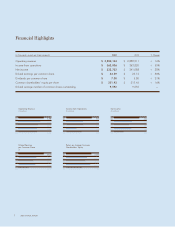Washington Post 2004 Annual Report Download - page 12
Download and view the complete annual report
Please find page 12 of the 2004 Washington Post annual report below. You can navigate through the pages in the report by either clicking on the pages listed below, or by using the keyword search tool below to find specific information within the annual report.
THE WASHINGTON POST COMPANY 10
One of Jonathan Grayer’s many great successes has been identifying acquisitions
that had the potential for substantial revenue growth long after the acquisition was
made. In 2004, 33% of revenue growth came from acquisitions made in 2003 or
2004; the rest was organic.
Recounting Kaplan’s successes of the past ten years makes them seem easy or certain.
Fortunately, we had the previous ten years to teach us better. Education is a hard
business, strictly regulated in part and hotly competitive. Reputations for excellence
take a long time to establish and can vanish quickly.
There is nothing automatic about continuing growth in this field. Kaplan has the
management depth to succeed, but it won’t be easy.
Corporate expenses increased (three words we hate). Much of this was owed to the
odd implementation of the law called Sarbanes–Oxley. The regulations adopted to
implement it added more to busy-work than to any rational shareholder benefit. Our
costs attributable to Sarbanes–Oxley were in the $5 million to $6 million range.
Our growth in 2004 brought us a number of new shareholders: welcome to you. To
repeat some words veteran shareholders have heard before: this company is run on
somewhat unusual principles. We are interested in growing the intrinsic value of the
company over the long term.
We are not interested in short-term results or in the price of the stock in the near future.
All our interest focuses on making the company as valuable as possible many years from
now. (If the long-term value of the company increases, the stock price will do so as well.)
























